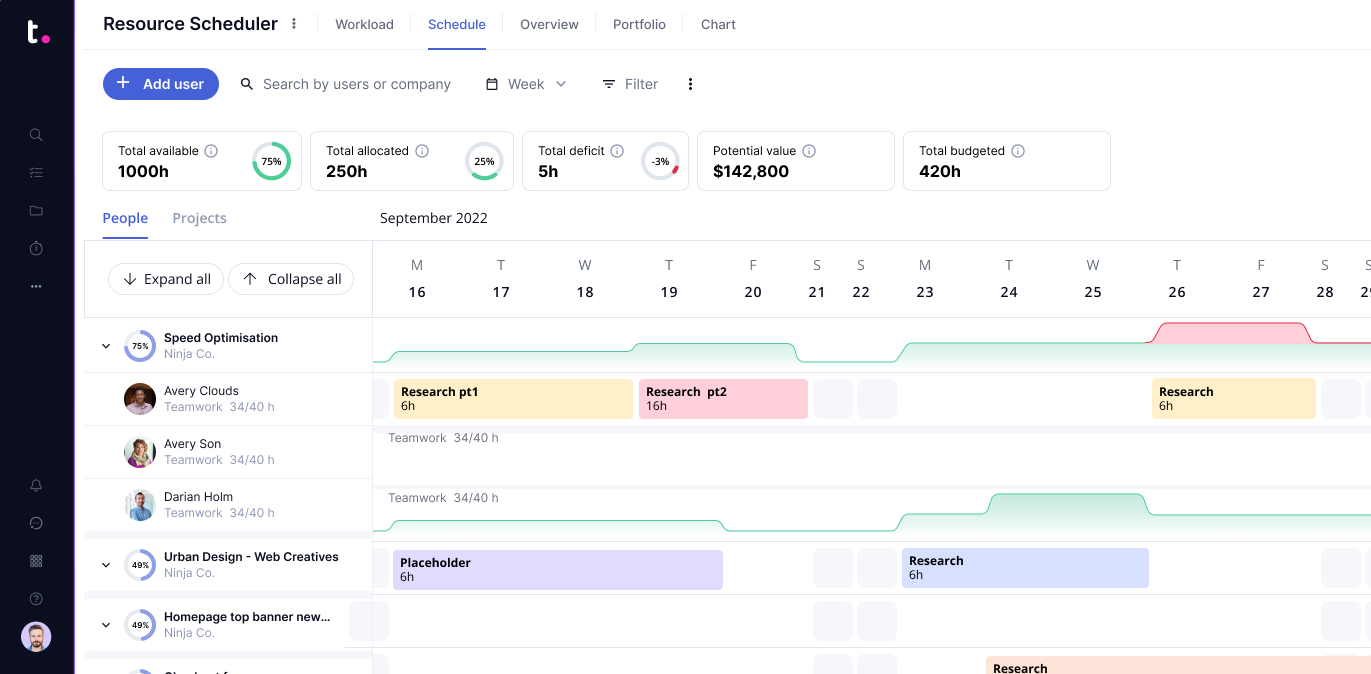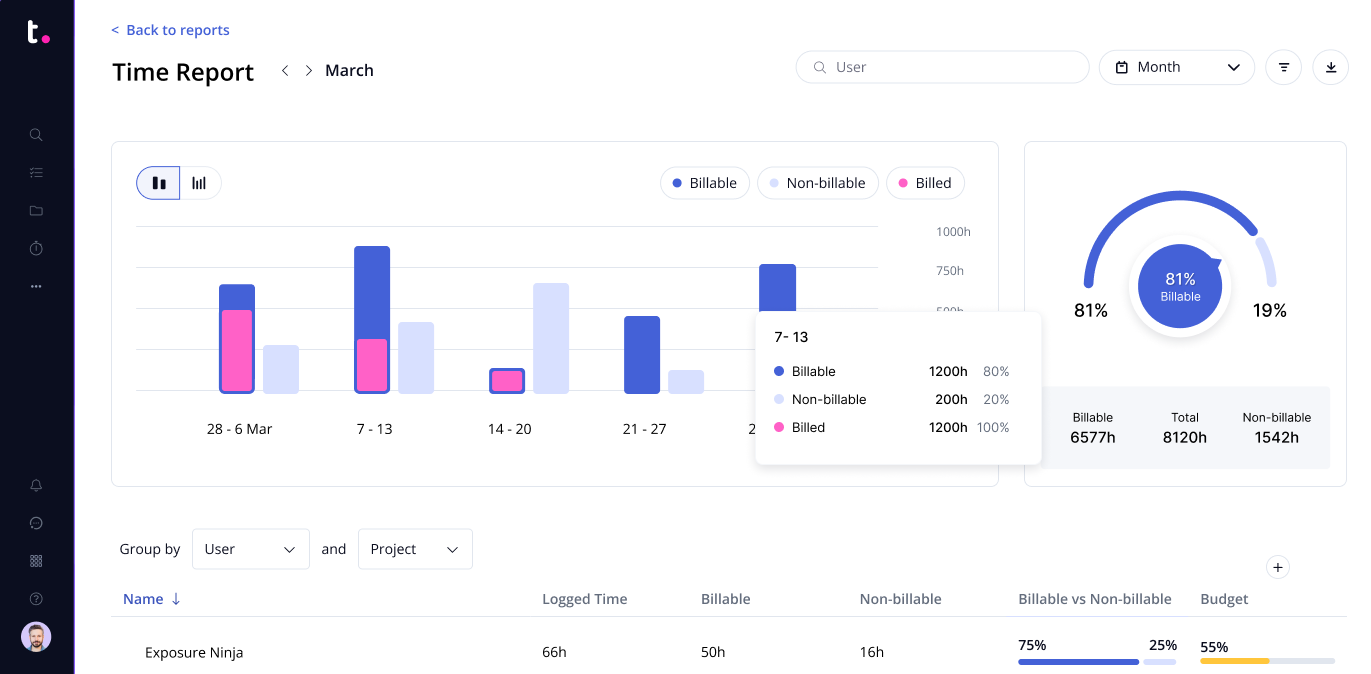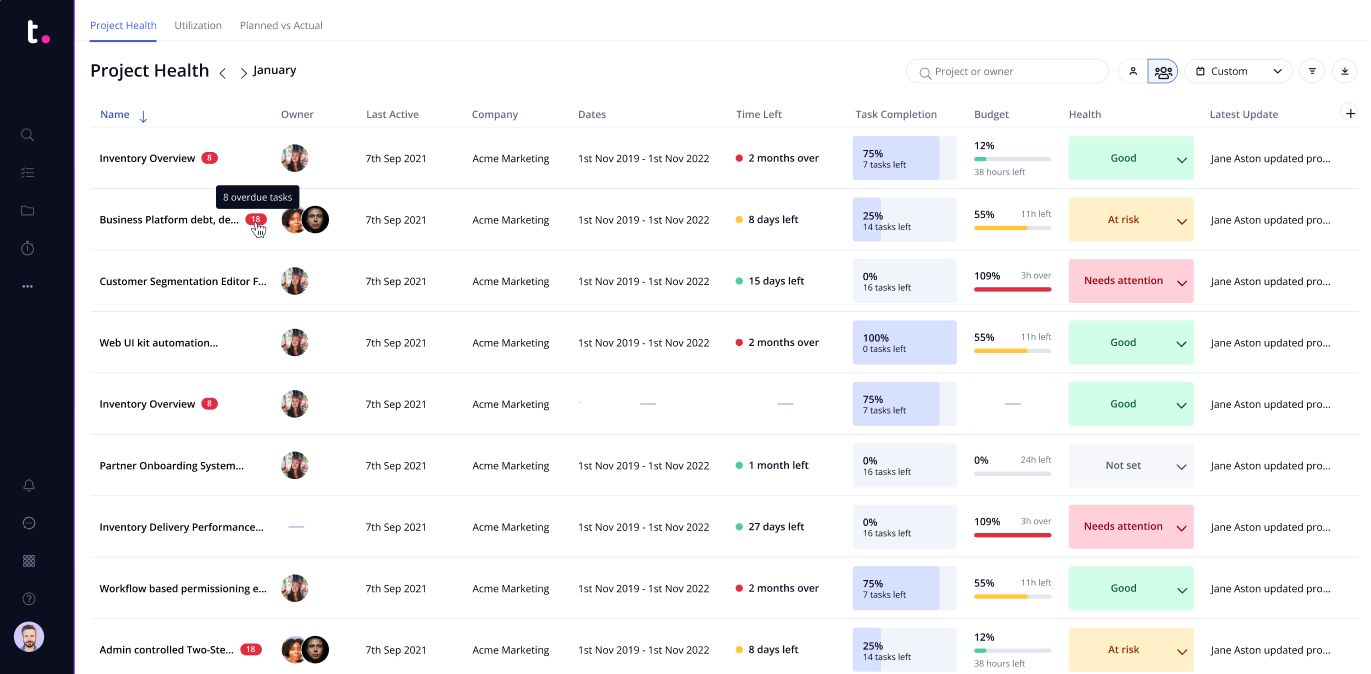If you’ve spent any time in project management since space 2006, you’ve probably heard of Wrike.
It’s been a popular project management software for teams at large enterprises. With time-saving templates, Kanban boards, and integrations with more than 400 applications, this platform does have a lot to offer.
But is it the best option for your agency and its unique needs?
With so many project management platforms available today, it can be hard to confidently narrow down your options. But if you're unsure about Wrike due to pricing or its lack of standard budgeting and time-tracking features, there are plenty of Wrike alternatives!
Check out our list of handpicked Wrike alternatives below, along with some of each platform's top features, potential pros and cons, and pricing models to inform your decision.
1) Teamwork

Teamwork takes a lot of pride in being one of the best Wrike alternatives specifically designed for client work rather than internal teams at large enterprises. Our platform offers all the features you need to manage your team and your client work without the constant upsells or gatekeeping of the tools you need to thrive.
Plus, Teamwork offers a free, no-obligation trial with no credit card required, so you can test drive it for yourself before you commit to anything.
One Agency Project Manager who chose Teamwork over Wrike had this to say of our software:
“The best part about Teamwork is the bird's-eye-view that it gives employees and managers over everything that is going on within the company. We really appreciate having our time tracking system tied directly to the tasks within a project. It makes it much easier to log time and see how much time was spent on each area of the project.”
Features
Time tracking tools that make it easier to keep projects focused, on budget, and on schedule.
Workload planner that helps you assign tasks to your staff fairly and without going over capacity.
Project budget tool for setting up and tracking time-based budgets.
Profitability reports to capture your net profit at a glance, see your remaining budget, and inform your decision-making.

Pros
Ease to use with no steep learning curve to overcome — simply log in and start using Teamwork to your full potential.
Teamwork was built specifically for client work. You can use it for billing, invoicing, time tracking, setting time budgets per projects, and forecasting–all in one place.
Grow Plan is nearly a third less expensive than Wrike's comparable plan ($18 per user/per month vs. $24 per user/per month) and comes with more robust project management features, including project time budgeting, invoicing, and billing.
Ability to quickly and easily import data from your existing Wrike account directly into the Teamwork platform.

Cons
It may take some time for new users to get comfortable using all of the platform's robust features.
Could benefit from more onboarding tutorials, but Teamwork Academy has recently been launched to provide greater support.

Teamwork: The Wrike alternative designed for agencies
Learn more about how Teamwork is the Wrike alternative designed with client work in mind.
Pricing Options
Teamwork's pricing begins with a free plan that's available for up to five users. From there, plans range from $5.99 per user per month (when billed annually) to $17.99 per user per month for the most popular Grow plan. This plan is ideal for more complex client projects and agencies with larger teams, offering workload and capacity management tools and advanced budgeting features.
All Teamwork plans are available with a free 30-day trial.
2) Hive

Credit: Hive
Looking for a project management platform designed with hybrid work in mind? Hive has you covered with flexible project layouts, group messaging, file sharing, and more to connect all aspects of your team's work regardless of your setup. Meanwhile, new features are constantly being added based directly on customer feedback and voting — so you can be sure your voice is heard.
Features
Several different project viewing options (including Gantt, Kanban, table, calendar, and portfolio view) to help your team visualize complex timelines.
Integrations with more than 1,000 other applications for less toggling between tools.
Timesheets, time tracking, and team resourcing to optimize every project and meet milestones.
Customizable dashboards, team reporting, and analysis to visualize project progress.
Pros
Regular updates and roll-outs of new features keep the Hive platform on top of your team's changing needs.
A minimal learning curve, plus plenty of onboarding resources on the Hive website.
Responsive support team is prompt to address issues and resolve bugs.
Cons
Desktop and mobile apps lack the usability of the browser version.
More detailed analytics and reports can be cumbersome to generate.
Customization features may be overwhelming for some.
Pricing Options
There are three plan options available for Hive users. The first is a free plan that's ideal for small teams and comes with limited storage and tasks and subtasks for up to 10 users.
For larger groups, a Teams plan is available for $12 per user per month (when billed annually) and comes with unlimited storage, time-tracking features, cloud storage integrations, and more.
Finally, a customizable Enterprise plan is available upon request and comes with enhanced security, unlimited users, onboarding assistance, and a dedicated Customer Success Manager.
A free 14-day trial is available for Hive's most popular team plan, so you can test it out with no obligation to buy.
3) Hibox
Hibox is another popular team collaboration and task management tool that's designed to keep your team on schedule and on budget. Whether your employees are collaborating in-person, remotely, or some combination of both, Hibox has plenty of tools to keep things moving and keep everybody on the same page.
Features
Secure company chat with public rooms, dedicated project streams, video chat tools, and more. No integrations needed.
Artificial intelligence (AI) bot to help team members through their everyday tasks.
Robust search tools to help you find anything you need in a matter of seconds.
Dedicated file sharing with available integrations for Dropbox, Google Drive, and other popular solutions.
Pros
Customizable user interfaces make it easy for users to create a dashboard that works for them.
Robust chat and video-calling features keep team members on the same page with ease.
Plenty of file-sharing options with the ability to see previews, leave file comments, and organize files into folders and sub-folders.
Cons
No free version is available.
Free trial is limited to just seven days, which may not be long enough to make a confident decision.
Some users have complained that the Hibox customer service and support team lacks responsiveness.
Pricing Options
The Hibox platform is available with two different plan options. The first is a $6 per month per user Pro plan that offers unlimited accounts, unlimited app integrations, video conferencing tools, and advanced task management.
For those who need additional features like audit logging, unlimited storage, and priority support, the $8 per user per month Enterprise plan may be a better option.
Both plans are available with a free seven-day trial.
4) Trello

Credit: planyway
Trello (created by Atlassian) is yet another Wrike alternative to consider for your agency's project management and client work. This simple yet powerful tool is designed for workflows of all scopes and sizes, enabling teams to get more done while customizing nearly every aspect of even the most complex projects.
Features
A variety of view options allows your team to see projects from every angle.
Butler automation allows you to automate tasks, freeing up valuable time and resources.
Easy-to-use templates help your project get off to the right start while saving you time.
Power-ups, plug-ins, and integrations help your team get the most of the apps it's already using.
Pros
Intuitive, easy-to-use interface lessens the learning curve when implementing new software.
Dashboards, workspace backgrounds, and colors are fully customizable for each user.
Trello boards (similar to Kanban boards), dashboard view, table view, and calendar view help teams manage work more efficiently.
Cons
Trello's free version likely won't offer enough features to accommodate the needs of an agency.
Size limitations on attachments in some plans may be an issue for some teams.
Desktop and mobile apps lack functionality when compared to the browser experience.
Pricing Options
Trello is free to use for smaller teams of 10 or fewer users. However, for larger terms, a Standard plan ($5 per user per month when billed annually) may be the better option, as it offers unlimited boards and users, and more advanced features.
Teams needing additional features (such as more data visualization tools and more robust security) will want to look at either the Premium ($10 per user per month) or Enterprise ($17.50 per user per month) plans instead.
Trello offers a free trial period, but only on select plans.
5) Quire
The Quire platform is built around the idea that projects are a lot more manageable when you break everything down into small, digestible parts. With plenty of visualization tools, planning tools, and scheduling features, there's a reason Quire is already trusted by more than 100,000 teams worldwide.
Features
Nested task lists make it easy to break down even the largest projects into smaller parts.
Time tracking allows you to keep track of working hours across projects and generate reports for valuable insights.
Send invitation links to clients so they can access your project without needing to sign up.
Enjoy in-platform instant messaging for improved communication and collaboration among team members.
Pros
All platform tools and features can be seamlessly accessed on the web or mobile app.
Integrate and sync with a variety of other apps, including Microsoft Teams, Google Calendar, Slack, and more.
Simplistic design is easy to follow and understand but still allows for plenty of customization.
Cons
Integration with some apps can be choppy or unreliable.
Free plan has limited storage of just 400MB and can only accommodate 10 users.
Lacks robust communication tools (such as video chat) that some other platforms offer.
Pricing Options
Quire is available with four different plan options, including a free plan that's good for up to 10 users. Most agencies, however, will need a paid plan to meet their needs.
A Professional plan starts at just $7.65 per user per month (when billed annually) and includes essential features like time tracking, 10GB of storage, and advanced permission control.
For larger teams with greater storage needs, the Premium ($13.95 per user per month) or Enterprise plan ($19.95 per user per month) may be more suitable.
A free 30-day trial is available for the Premium, Professional, and Enterprise plans.
6) Celoxis

Credit: DeskTime
Celoxis is an all-in-one project management solution that offers advanced features, streamlined workflows, and data-driven insights for teams of all sizes. In addition to project management, this platform is focused on optimizing profitability and efficiency with detailed tracking tools, intake management, resource management, and more.
Features
"What-if" analysis tool allows you to make confident decisions based on custom metrics and resource capacity.
Custom workflow apps allow you to define, track, and streamline your business processes for greater productivity.
Kanban boards, Gantt charts, and plenty of other customizations help team members visualize projects at every stage.
Dedicated client portal is fully customizable and helps your team leave a positive impression.
Pros
Robust security features keep data safe and give teams and clients greater peace of mind.
Simplistic and easy-to-use interface, despite its wide range of key features offered.
Offers real-time reporting and analytics to help teams make the right decisions.
Cons
No free version is available.
Pricing is on the higher end when compared to similar project planning platforms.
Customer service and support is limited.
Pricing Options
Two plan options are available for Celoxis users. One is a cloud-based plan billed monthly at $25 per user (though discounts are available for annual or two- and three-year plans). An on-premise version of the software is also available and includes free support for one year, though pricing is customized depending on your needs.
A 30-day free trial is available for agencies who want to give Celoxis a try before committing to a plan.
7) Project Insight
If you're looking for a flexible and customizable work management platform with an established reputation among agencies of all sizes, Project Insight may be right for you. This award-winning platform aims to centralize your work and tasks into an all-in-one option that keeps your teams focused and your clients informed.
Features
Integration with popular apps, including Microsoft Teams and Slack.
Mobile app and web-based version to meet your team's dynamic work needs.
Project budgeting, time tracking, and time sheets.
Plenty of templates to get your projects off to a solid start.
Pros
Established in 2002 and has been trusted by more than 10,000 users since its founding.
The free version comes with a surprising number of features.
Plans are fully customizable, so you only pay for what you actually need.
Cons
Search tools can be cumbersome to use.
Users report a bit of a learning curve with the platform.
Time-tracking tools can be complicated, especially when entering time manually.
Pricing Options
What really sets Project Insight apart as a project management tool is that its free edition can be customized to meet your exact needs. This means your team can start with the free version and then add features à la carte as needed. And most add-ons cost just $3 per user, making this one of the more affordable options on the market.
If you want everything included from the start, an Enterprise plan is available with customized pricing based on your agency size and other factors. You can also request a personalized demo of the product before you commit to a plan.
8) Toggl

Credit: Toggl
Toggl is an online project management tool that boasts "beautifully simple planning" for creative teams (including software development teams) of all sizes. This flexible and customizable platform is streamlined with plenty of features to help teams get more done, boost profitability, and keep clients in the loop. Trusted by more than 70,000 businesses, this platform has a little something to offer for every agency.
Features
Offline tracking makes it easy to track time now and sync later.
Mobile and desktop apps help your teams stay productive from anywhere.
More than 100 integrations with other popular apps and extensions help your team get more done.
Calendar view helps you see the big picture while seamlessly integrating with Google and Outlook calendars.
Pros
Time tracking goes beyond basic billable hours to track between specific clients, projects, and tasks.
Mobile app is reliable and user-friendly.
Plenty of ways to customize the interface for every team member's needs.
Free plan offers unlimited time tracking, unlimited clients, and exportable reports.
Cons
Lack of communication and collaboration tools offered by many other platforms.
Platform can take some getting used to for new users.
Paid plans get a little pricey.
Pricing Options
There are several plan options available on Toggl, beginning with a free version that's suitable for up to five users. From there, you have a $9 per user per month (when billed annually) plan that includes pre-populated project templates, time rounding for reports, and more.
The Premium plan ($18 per user per month) is the most popular for agencies, adding the ability to archive clients and create fixed-fee projects. Toggl also offers custom pricing for larger organizations, which includes expert training and priority support.
All plans are available with a free 30-day trial. No credit card needed.
See the difference for yourself: Try out Teamwork today
If your team is ready to ditch Wrike or is still shopping around for the right project management software, these alternatives are an excellent starting point. With features more geared towards the needs of a growing agency, these top Wrike alternatives can set you up for success with your clients.
Teamwork offers many features that set it apart from Wrike, Asana, ClickUp, Basecamp, and other project management platforms so your teams can align and get more done. Get in touch today to learn more or start your free 14-day trial!


